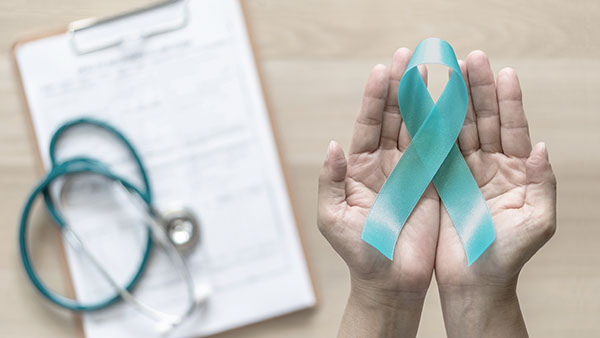
January is all about new beginnings. It's a good time to reassess your eating habits, your exercise routine, and your overall health — and that includes your cervical health.
There are so many areas of your health to maintain, both physically and emotionally, that your cervical health may end up far down that list. Since January is Cervical Health Awareness Month, now is the perfect time to prioritize your cervical health.

As you practice cervical cancer prevention this month and beyond, here are 3 ways to improve your cervical health.
1. Get Screened.
Screening tests are some of the most helpful tools in medicine. From mammograms to colonoscopies to blood pressure screenings, these advancements in healthcare help save countless lives each year.
When it comes to cervical cancer, the most common kind of cervical cancer begins with changes that happen before cancer develops. By finding precancers, you can prevent them from becoming invasive cervical cancer . And it's important to get started early — women who have been regularly screened before age 65 rarely develop cervical cancer.
There are two screening tests available for cervical cancer — the Pap test (also called a Pap smear) and the human papillomavirus (HPV) test.
These tests are done the same way. Your healthcare provider will use a special tool to brush or gently scrape the cervix to collect cells for testing . While the Pap test is used to detect cancer and pre-cancer cells, the HPV test is used to identify infection from types of HPV that are more likely to cause cancers and precancers of the cervix.
Which screenings you need — and how often you need them — depend on your individual situation. Talk to your healthcare provider to make sure you’re getting the most out of these life-saving tools.
2. Get Vaccinated.
Vaccines are another impressive part of healthcare research that save millions of lives around the globe every year. Thanks to studies done way back in the 1990s, HPV vaccines can prevent around 90% of cervical, vulvar, vaginal, and anal cancers.
The HPV vaccine (called Gardasil 9) protects children and young adults against nine types of HPV, many of which are linked to cancer. These vaccines can only prevent infection — they cannot treat an infection that someone already has. That’s why it's important for women to get their HPV vaccine before becoming exposed to HPV, such as through sexual activity.
The American Cancer Society recommends the following people get the HPV vaccine:
- Children between the ages of 9 and 12
- Children and young adults between the ages of 13 and 26 who have not been previously vaccinated or have not received all of their doses
The HPV vaccine is most effective in young adolescents. However, this begins to decrease around age 18. Because the vaccine is not likely to provide much benefit for cancer prevention as people get older, it’s not recommended for anyone over 26 years old.
If you're not of age to get the HPV vaccine, talk to the young people in your life who are, and make sure they know their options to prevent cervical cancer.
3. Live a Healthy Lifestyle.
As with many health conditions, maintaining your overall health is an important factor of preventing cervical cancer.
To start, HPV is common, and it’s spread through skin-to-skin contact with a person who is infected. Keep in mind — sex doesn’t have to take place for HPV to be passed from one person to another. Contact with an infected area (and even hand-to-genital contact) can spread HPV.
To protect yourself, limit your number of sex partners, and avoid sex with people who have had many other sex partners. And as always, use a condom.
Finally, don't smoke — and try to quit if you already do. Not smoking reduces cervical pre-cancer and cancer (not to mention cancers of the lung, mouth, stomach, and liver, to name a few ).
Your cervical health may not always be on your mind. But by taking these important steps, it doesn’t have to be. This Cervical Health Awareness Month, make sure you’re putting your cervical health higher up on that list — so you can rest assured that your cervix stays happy and healthy year-round.
Do you have questions about maintaining your cervical health? Reach out to your Chester County Hospital primary care provider or gynecologist to learn more about preventing cervical cancer.